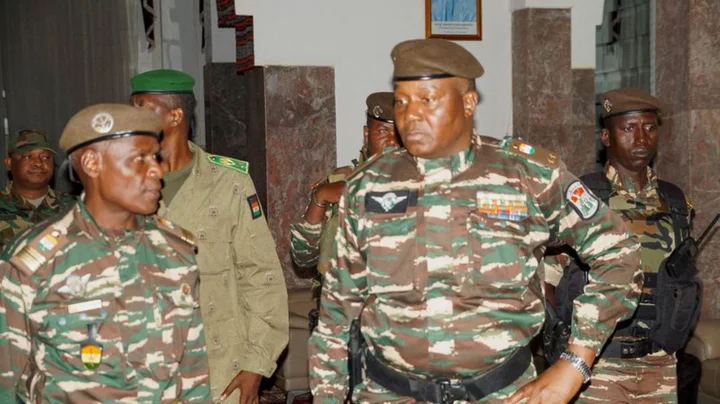By Edward McAllister
DAKAR (Reuters) -When Niger's coup leader Abdourahmane Tiani announced the overthrow of President Mohamed Bazoum on television last week, he cited persistent insecurity as justification.
But an analysis of data on attacks and casualties in the country, where an Islamist insurgency has raged, shows that security was actually improving thanks to tactics used by Bazoum's government and help from French and U.S. forces.
Those tactics and that support are in jeopardy now.
Meanwhile, coups can stoke insecurity. Violence has soared in neighbouring Mali and Burkina Faso since their militaries took power promising peace and shunning former Western allies, according to data from the Armed Conflict Location & Event Data Project (ACLED), a U.S.-based crisis-monitoring group.
Security analysts warn that the disarray in Niger could allow groups linked to al Qaeda and Islamic State to expand their reach across West Africa's Sahel region, where they have already killed thousands and forced millions to flee. It could also hobble economic development and democratic progress in one of the world's poorest areas.
"The coup is good news for jihadist groups," said Ibrahim Yahaya Ibrahim, a senior analyst at the International Crisis Group, a Brussels-based think tank. "The support of international forces, the stability in the capital city, all those things are now gone. It is likely that things will go bad."
In the first six months of 2023, violent incidents in Niger decreased by nearly 40% compared to the previous six months, according to the ACLED data, which is based on reports from sources including news organisations, human rights groups and local authorities. They included fighting between the army and militants, explosions and riots. But most incidents involve attacks on civilians, which dropped by half during that period.
Fatalities from violence, including both civilians and combatants, dropped by a third between 2021 and 2022, to just below 1,000, the data showed. They were less than 450 in the first six months of this year.
By contrast, in Mali, where there were two coups in 2020 and 2021, deaths in violent incidents more than doubled last year to nearly 5,000 as more than 2,000 French troops left and Mali's army teamed up with Russian private military contractor Wagner Group.
In Burkina Faso, where there were two coups last year, deaths rose 80% to more than 4,000 in 2022. They have already surpassed 5,000 this year.
Reuters was unable to reach Niger's coup leaders for comment. Military spokespeople in Mali and Burkina Faso did not respond to requests for comment.
Insecurity remains a major problem in Niger. Boko Haram insurgents from neighbouring Nigeria have plagued the southeast for years. And groups linked to al Qaeda and Islamic State are active in the southwest.
Still, many fear that the progress made could now unravel.
The United Nations special envoy for West Africa and the Sahel, Leonardo Santos Simao, said he hoped diplomacy would return Bazoum to power but worried about regional security if that failed. The main regional bloc, the Economic Community of West African States, on Sunday gave Tiani a week to restore Bazoum, or it would consider using force.
"If the situation is not reversed, it's very likely that the spread of terrorism in the region can increase," Simao said.
Many are unworried. Hundreds of people marched in the capital Niamey on Thursday in support of the junta as regional defence chiefs discussed possible intervention to restore democracy.
OUTSTRETCHED HAND
Violence crept into southwest Niger in 2018 as Islamist militants expanded from Mali, where they had been active since 2012.
By 2021, the semi-desert border area was overrun by fighters who won recruits among locals who felt sidelined by the government and angered by army abuses. Attacks on civilians and the military soared. One attack in January 2020 killed around 100 soldiers.
In 2022, Bazoum, who was elected in 2021, changed tack. He visited communities hit by violence and offered an "outstretched hand" to militants who were willing to down arms.
Government emissaries were sent to meet Islamist fighters and ethnic Fulani communities from which militants were recruiting. Local media reported prisoner releases in which insurgents were set free.
Bazoum also shied away from outsourcing the fight against Islamists to local militias, which security experts say has contributed to the bloodshed in Burkina Faso and Mali.
Military leaders in Mali and Burkina Faso kicked out French forces after their coups. Mali, whose leaders also demanded the withdrawal of a decade-long U.N. peacekeeping mission this year, has support from about 1,000 Wagner mercenaries, but they have failed to stem the unrest. Armed groups have flooded the east since the French left last year, threatening major towns, local officials and security experts said.
Niger, meanwhile, has enjoyed Western support. France has between 1,000 and 1,500 troops in Niger, with support from drones and warplanes. The U.S., which has about 1,100 personnel in Niger, provides intelligence.
But now the U.S. is threatening to suspend cooperation. France has cut financial support, and the European Union has suspended security aid.
"If this coup stays, then the entire Western military cooperation will probably be off," said Ulf Laessing, head of the Sahel programme at the Konrad Adenauer Foundation, a German think thank.
Niger army operations could falter, he said.
"You saw it in Burkina Faso after the second coup. The army fragmented. Officers were more concerned about their political careers than the front line. Some units were pulled back. This is the risk in Niger."
(Reporting by Edward McAllister; Additional reporting by Michelle Nichols in New York; Editing by Alexandra Zavis and Giles Elgood)

